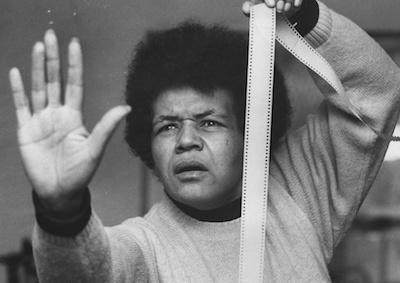Note: this is a one-time live screening.
“Where has this first song of Maldoror been...? Where did this song come from?”
—Les Chants de Maldoror, Comte de Lautréamont, 1868
On April 13 of last year, 90-year-old filmmaker, theater artist and mother Sarah Maldoror passed away due to complications from the coronavirus. The African diasporic film director has been remembered over the past year in various posthumous celebrations of her life, and her creative force has become a singular subject of collective rediscovery thanks to the front-running curatorial sense of feminist film publication Another Gaze coupled with the efforts of Maldoror’s daughter Annouchka de Andrade, who has tirelessly labored to preserve and share her mother’s legacy.
Born Sarah Durados in rural, southwestern France to parents of West Indian and French descent, the multidimensional maker was initially drawn to the Parisian theater scene where, in 1956, she co-founded one of France’s first Black theater troupes in collaboration with other artists of the African diaspora. Half a decade later she pivoted her creative focus to cinema, first studying filmmaking under Soviet director Mark Donskoy in 1961 before working as assistant director to Gillo Pontecorvo on The Battle of Algiers (1966), a milestone of revolutionary cinema. Claiming that Black artists “are the only ones who should tell our history,” Maldoror—who changed her last name after an inspirational encounter with the 19th century poem, Les Chants de Maldoror—would forge her own visual transmissions of African culture by directing over two dozen films, including documentaries, fiction shorts, and feature-length narrative and television films.
The Archive is honored to again partner with the Black Feminism Initiative at UCLA to present two of Sarah Maldoror’s markedly distinct works: her first short, Monangambé (1969), and her satiric, delightful French television film, Dessert for Constance (1981). Presented in dialogue with each other, the two works construct a nuanced portrait of Maldoror’s unique formal, social and political concerns.
Post-screening conversation with Maldoror’s daughter, producer and distributor Annouchka de Andrade; UCLA Cinema & Media Studies Ph.D. candidate Zama Dube; and UCLA School of Theater, Film and Television Associate Professor Ellen C. Scott.
Special thanks to John H. Mitchell Television Archivist Mark Quigley.
Monangambé
Algeria, 1969
Maldoror’s directorial debut, made in collaboration with non-professional actors and shot outside the capital city of Angola during the Armed Struggle of National Liberation, paved the way for her first feature-length work, Sambizanga (1972), widely considered to be the premiere film directed by a woman in Sub-Saharan Africa. The film’s anti-colonialist spirit inspired the avant-garde jazz group Art Ensemble of Chicago to offer their arresting score free of charge.
B&w, in French with English subtitles, 16 minutes. Director: Sarah Maldoror. Screenwriter: Sarah Maldoror, Mario de Andrade, Serge Michel. With: Mohamed Zinet, Carlos Pestana, Elisa Andrad.
Dessert for Constance (Un dessert pour Constance)
France, 1981
This subversive comedy follows a 19th-century cookbook from a stuffy Parisian auction house to a public trash bin, where it is discovered by waste workers Bokolo and Mamadou and taken home to the living space they share with several other Senegalese émigrés. When their friend Bono falls ill and wishes to return to Senegal, the contents of the book become an opportunity to win the fee for his passage on a television game show. A production for French national public television channel Antenne 2, Dessert for Constance was Maldoror’s first television movie but not her first foray into the medium: by 1978, she had also directed three episodes of the long-running Chroniques de France (1964-1978), including an installment on Surrealist French poet Louis Aragon.
Color, in French with English subtitles, 52 minutes. Director: Sarah Maldoror. Screenwriter: Maurice Pons. Based on a story by: Daniel Boulanger. With: Sidiki Bakaba, Cheik Doukouré, Elias Sherif.







 Mobile Navigation
Mobile Navigation

